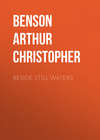Lesen Sie nur auf Litres
Das Buch kann nicht als Datei heruntergeladen werden, kann aber in unserer App oder online auf der Website gelesen werden.
Genres und Tags
Altersbeschränkung:
12+Veröffentlichungsdatum auf Litres:
25 Juni 2017Umfang:
320 S. 1 IllustrationRechteinhaber:
Public DomainСлайдер с книгами
Fb2ZIP-Archiv 277.2 КБ
Geeignet für Smartphones, Android-Tablets, E-Reader (außer Kindle) und viele Programme
HTML
Sie können das Buch direkt im Browser lesen
HTMLZIP-Archiv 277.1 КБ
Sie können das Buch direkt im Browser lesen
TXT
Kann auf fast jedem Gerät geöffnet werden
TXTZIP-Archiv 177.5 КБ
Kann auf jedem Computer geöffnet werden
RTFZIP-Archiv 288.4 КБ
Kann auf jedem Computer geöffnet werden
PDF A4
Wird in Adobe Reader geöffnet
PDF A6
Optimiert und geeignet für Smartphones
Mobi
Geeignet für Kindle E-Reader und Android-Apps
Epub
Geeignet für iOS-Geräte (iPhone, iPad, iMac) und die meisten Lese-Apps
iOS.Epub
Ideal für iPhone und iPad
Fb3
Entwicklung des FB2-Formats




















